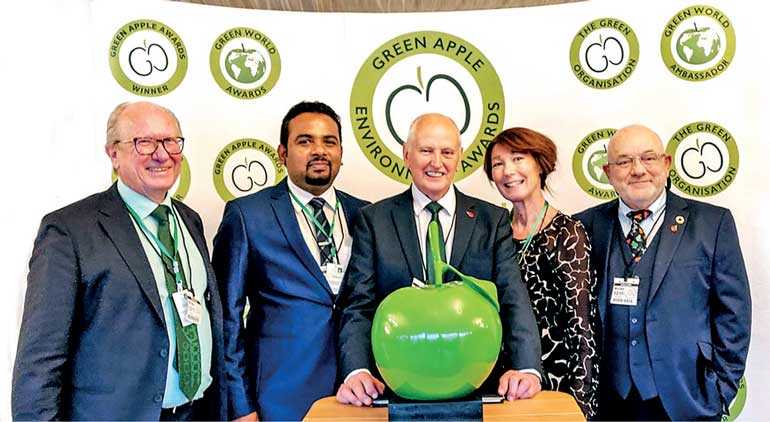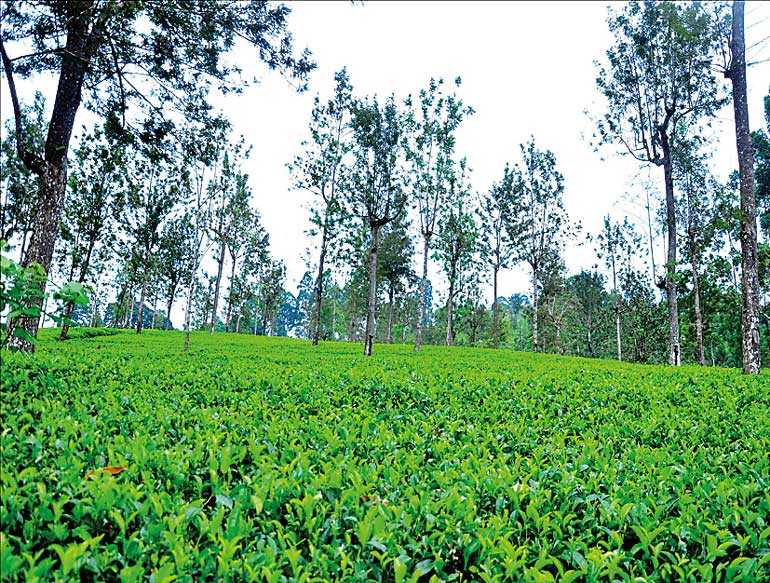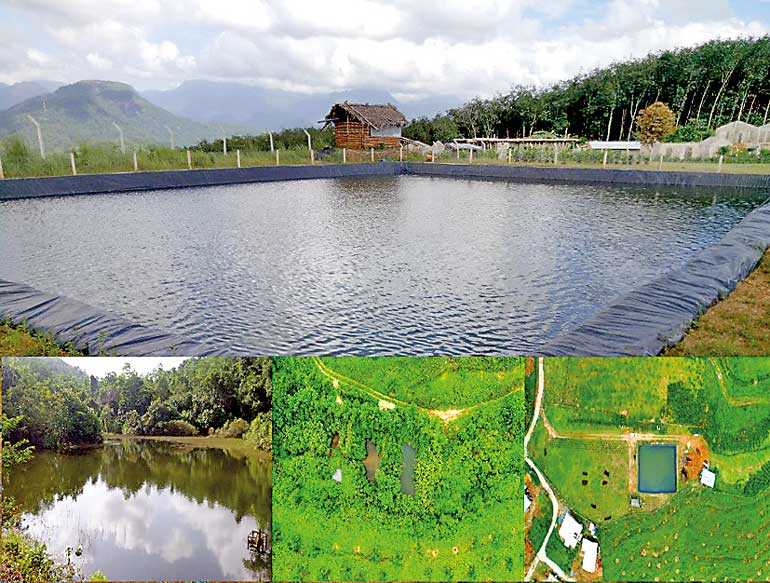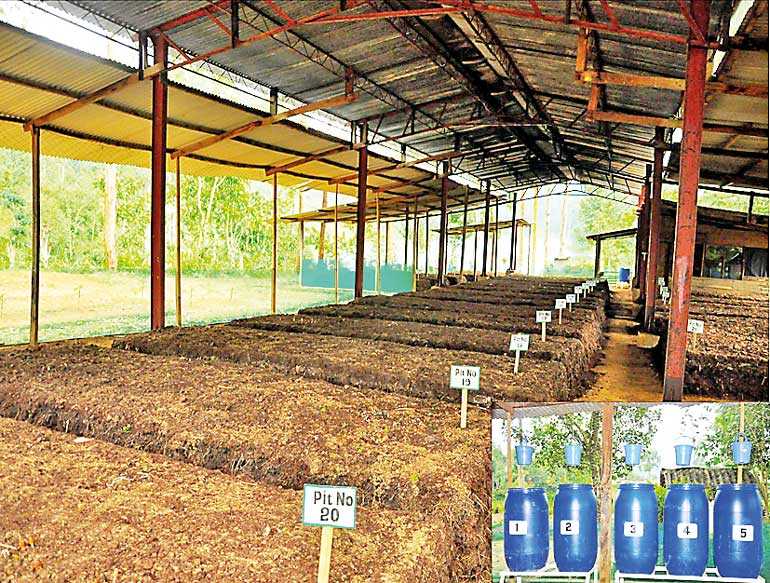Wednesday Feb 25, 2026
Wednesday Feb 25, 2026
Thursday, 28 March 2019 01:33 - - {{hitsCtrl.values.hits}}




After becoming the first company in the world to secure Uncompensated Carbon Neutral certification for its tea growing, manufacturing and marketing processes, Bogawantalawa Tea Estates PLC (BTE) is now setting its sights on even loftier environmental goals. For the producer of some of the country’s finest tea, this means a rapid migration towards official Climate Positive status - the point at which it will go beyond just achieving net zero carbon emissions and actually begin removing additional carbon dioxide from the environment.
The journey towards this objective is now firmly underway, with the scope of the company’s environmental efforts spanning all of BTE’s units.
Bogawantalawa Tea Ceylon General Manager (Sustainability and R&D) Thusitha Bandara said: “As the first tea company to be formally certified as Uncompensated Carbon Neutral, we can state with confidence that there is incredible potential in the Sri Lankan Regional Plantation Company (RPC) sector to set a new global standard for the plantation industry. Combatting climate change is a collective global responsibility and with our industry, we believe that it is ultimately the RPC sector which will pave the way for a new chapter in the plantation industry, both locally and globally.
“As our efforts in this field intensify, Bogawantalawa Tea is now racing towards Climate Positive status, and we believe that the potential exists for the entire RPC sector to learn from our experiences and adapt their business models accordingly. While it will require significant investment and effort, we believe that there is an extremely compelling economic and environmental case in favour of climate positive business models.
“The effects of climate change and global warming are clear to see across the world and are growing increasingly severe with each passing year. As a major agricultural entity, we cannot stand idly by and allow business to continue as usual while the fate of future generations is in major jeopardy. We want to set an example which will be emulated not just across the industry but throughout the country.”
Comprehensive carbon audit
BTE and Bogawantalawa Tea Ceylon Ltd. (BTC) were certified Carbon Neutral by the Sri Lanka Climate Fund, which operates under the Ministry of Environment. Assessment was carried out over Scope 1, Scope 2 and Scope 3 Greenhouse Gas Emissions.
This required major revisions not only to operational procedures at the estate level but also at the company’s Colombo facilities, where it took stock of every aspect of the business from packing materials to sourcing.
Where the scope of a typical tea company’s carbon emissions audit would be limited to the estate, BTE extended the range of its audit right up to the point where their tea reaches the port. A comprehensive list of emissions sources are factored into BTE’s analysis – including everything from emissions generated via production of fertiliser and agro-chemicals to transmission loss of electricity to factories. Going beyond rudimentary analysis however, BTE also factors in transport, and even travel of overseas business visitors within the scope of their audit. In order to maintain complete transparency, the company shares the entire set of details around its CO2 audit as part of its regular stakeholder reporting.
Maintaining Carbon Neutral status and shifting towards being a Climate Positive tea grower, manufacturer and marketer have required both BTE and BTM to maintain extremely rigid standards and controls across the company’s entire value chain, developed in alignment with United Nations Sustainable Development Goals.
These strategies encompass renewable energy, energy management, plantation forestry, conservation forestry, social forestry, organic farming, use of bio-fertilisers, organic pesticides, water and waste footprint management, sustainable soil development, eco designing and climate action.
A progressive approach in agriculture techniques
Progressive soil management techniques are fundamental to the continuing success of BTE’s approach. Notably, BTE has successfully developed its own inorganic &organic fertilisers, which serve to protect and enhance soil physical, chemical and biological properties.
It complements the use of these breakthrough fertilisers with internally developed organic pesticides for which BTE’s dedicated research and development cell is currently working to patent and upscale to the level of commercial production. Combined with soil mapping techniques that determine individual fertiliser requirements for each field, BTE is able to ensure optimal nourishment uptake with unprecedented precision.
In addition to developing its own products, the company’s strategy of integrated pest and disease management augments biological controls together with shade and ground cover management to ensure that its crop is kept healthy while avoiding excessive inorganic inputs.
BTE also optimises water management through techniques such as drip irrigation, moisture conservation, large-scale rainwater harvesting and together with a host of measures aimed at conserving the company’s water footprint and even extending into awareness building programmes at the community level.
Efficiency and renewable energy
In addition to optimising electricity usage, BTE has also invested significantly in harnessing of renewable energy such as hydro and solar. Currently, the company generates a collective 12 Gigawatt hours (GWh) of energy through 2GWh of solar and 10GWh of hydropower. Over the medium term, the company is working to rapidly upscale renewable energy capacity with a potential 41 GWhs through expansions of existing solar and hydropower and the introduction of new wind energy leading to even greater carbon sinking capacity. This investment in renewable energy sources will help BTE to cut its greenhouse gas emissions by 30,088-tonnes.
Trees for the future
BTE’s agroforestry activities also contribute significantly to long-term sustainable development within both the community and its estates. It attains this through plantation forestry, social forestry and conservation forestry programmes.
With its plantation forestry work, BTE has initiated commercial-scale planting and harvesting projects. Its central nursery, currently Sri Lana’s largest timber nursery, grows 200,000 seedlings of varying varieties such as timber, firewood, herbs and fruit plants each year. Moreover, as part of its Agroforestry efforts, BTE aims to plant one million trees by 2020. It is steadily approaching this goal, having already planted 600,000 trees.
Furthermore, BTE shares the benefits of its planting programmes with the community, distributing planting materials as well as its fruit, herb and native species of plants, which are presented free of charge. Special emphasis is placed on schoolchildren looking after these plants, with each plant given a name and a child tasked with the responsibility of looking after it. These initiatives go a long way in aiding the enrichment of community gardens through the promotion of organic vegetable farming.
The company’s commitment to social conservation and plantation forestry is reflected by its significant investment in these causes, which amounts to between Rs. 20 million and Rs. 25 million annually. These investments are channelled into conservation of sensitive areas, biodiversity enrichment, watershed conservation, together with training and awareness building programmes.
At the level of social forestry, BTE also distributes planting material and runs planting programmes that are open to the public. These forums focus on promoting organic vegetable farming and the enrichment of home gardens.
Growing global recognition
Given the unprecedented innovations taking place at Bogawantalawa Tea Estates, the company has already been certified to the highest international accredited standards in terms of sustainability, food hygiene and ethics, and is rapidly gaining global attention for its pioneering work. All its estates in the Central Province’s Golden Valley are Rainforest Alliance, Ethical Tea Partnership, Fairtrade, ISO 22000:2005 and ISO 9001:2008 certified.
BTE claimed the prize for New Sustainable Product at the Sustainable Food Awards in Amsterdam last year. This success caught the attention of Nina Pullman, a respected freelance journalist for the Guardian in the UK and the Deputy Editor of Fresh Produce Journal, who travelled to the Golden Valley for a story which was published in the reputed Huffington Post of the UK.
Bogawantalawa Estates was also declared a Green World Ambassador and presented with a World Green Apple Award in the F&B at a prestigious ceremony held in the Houses of Parliament in Westminster, London.